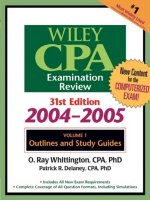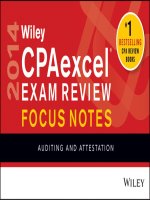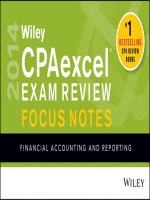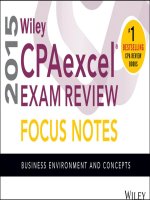2014 WILEY CPA excel focus notes auditing
Bạn đang xem bản rút gọn của tài liệu. Xem và tải ngay bản đầy đủ của tài liệu tại đây (2.86 MB, 280 trang )
2014
Wiley
®
CPAexcel
EXAM REVIEW
FOCUS NOTES
2014
Wiley
®
CPAexcel
EXAM REVIEW
FOCUS NOTES
AUDITING AND ATTESTATION
Cover Design by David Riedy
Cover image: © turtleteeth/iStockphoto
Copyright © 2014 by John Wiley & Sons, Inc. All rights reserved.
Published by John Wiley & Sons, Inc., Hoboken, New Jersey
Published simultaneously in Canada.
No part of this publication may be reproduced, stored in a retrieval system or transmitted in any form or by any means, electronic,
mechanical, photocopying, recording, scanning or otherwise, except as permitted under Section 107 or 108 of the 1976 United
States Copyright Act, without either the prior written permission of the Publisher, or authorization through payment of the appropriate
per-copy fee to the Copyright Clearance Center, Inc., 222 Rosewood Drive, Danvers, MA 01923, 978-750-8400, fax 978-7504470, or on the Web at www.copyright.com. Requests to the Publisher for permission should be addressed to the Permissions
Department, John Wiley & Sons, Inc., 111 River Street, Hoboken, NJ 07030, 201-748-6011, fax 201-748-6008, or online at http://
www.wiley.com/go/permission.
Limit of Liability/Disclaimer of Warranty: While the publisher and author have used their best efforts in preparing this book, they
make no representations or warranties with respect to the accuracy or completeness of the contents of this book and specifically
disclaim any implied warranties of merchantability or fitness for a particular purpose. No warranty may be created or extended
by sales representatives or written sales materials. The advice and strategies contained herein may not be suitable for your
situation. You should consult with a professional where appropriate. Neither the publisher nor author shall be liable for any loss
of profit or any other commercial damages, including but not limited to special, incidental, consequential, or other damages.
For general information on our other products and services, or technical support, please contact our Customer Care Department
within the United States at 800-762-2974, outside the United States at 317-572-3993 or fax 317-573-4002.
Wiley also publishes its books in a variety of electronic formats. Some content that appears in print may not be available in
electronic books. For more information about Wiley products, visit our Web site at .
ISBN: 978-1-118-81683-7 (paperback); 978-1-118-85422-8 (ebk); 978-1-118-87198-0 (ebk)
Printed in the United States of America
10 9 8 7 6 5 4 3 2 1
CONTENTS
Preface
About the Author
About the Contributor
Module 1:
Module 2:
Module 3:
Module 4:
Module 5:
Module 6:
Module 7:
Module 8:
Index
Professional Responsibilities
Engagement Planning, Obtaining an Understanding, and Assessing Risks
Understanding Internal Control and Assessing Control Risk
Responding to Risk Assessment: Evidence Accumulation and Evaluation
Reporting
Accounting and Review Services
Audit Sampling
Auditing with Technology
vii
ix
ix
1
22
50
96
160
223
239
255
263
v
PREFACE
This publication is a comprehensive, yet simplified study program. It provides a review of all the basic skills
and concepts tested on the CPA exam and teaches important strategies to take the exam faster and more
accurately. This tool allows you to take control of the CPA exam.
This simplified and focused approach to studying for the CPA exam can be used:
•
•
•
As a handy and convenient reference manual
To solve exam questions
To reinforce material being studied
Included is all of the information necessary to obtain a passing score on the CPA exam in a concise and
easy-to-use format. Due to the wide variety of information covered on the exam, a number of techniques
are included:
•
Acronyms and mnemonics to help candidates learn and remember a variety of rules and checklists
•
•
Formulas and equations that simplify complex calculations required on the exam
Simplified outlines of key concepts without the details that encumber or distract from learning the
essential elements
vii
•
•
•
Techniques that can be applied to problem solving or essay writing, such as preparing a multiple-step
income statement, determining who will prevail in a legal conflict, or developing an audit program
Pro forma statements, reports, and schedules that make it easy to prepare these items by simply
filling in the blanks
Proven techniques to help you become a smarter, sharper, and more accurate test taker
This publication may also be useful to university students enrolled in Intermediate, Advanced and Cost
Accounting; Auditing, Business Law, and Federal Income Tax classes; or Economics and Finance Classes.
Good luck on the exam,
Ray Whittington, PhD, CPA
Preface
viii
ABOUT THE AUTHOR
Ray Whittington, PhD, CPA, CMA, CIA, is the dean of the Driehaus College of Business at DePaul University. Prior to
joining the faculty at DePaul, Professor Whittington was the Director of Accountancy at San Diego State University. From
1989 through 1991, he was the Director of Auditing Research for the American Institute of Certified Public Accountants
(AICPA), and he previously was on the audit staff of KPMG. He previously served as a member of the Auditing Standards
Board of the AICPA and as a member of the Accounting and Review Services Committee and the Board of Regents of
the Institute of Internal Auditors. Professor Whittington has published numerous textbooks, articles, monographs, and
continuing education courses.
ABOUT THE CONTRIBUTOR
Kurt Pany, PhD, CPA, is a Professor of Accounting at Arizona State University. His basic and advanced auditing
courses provided the basis on which he received the Arizona Society of CPA’s Excellence in Teaching Award and
an Arizona CPA Foundation Award for Innovation in the Classroom for the integration of computer and professional
ethics applications. His professional experience includes serving for four years on the AICPA’s Auditing Standards
Board, serving as an academic fellow in the Auditing Division of the AICPA, and prior to entering academe, working
as a staff auditor for Deloitte and Touche.
ix
CODE OF PROFESSIONAL RESPONSIBILITIES
AICPA
General Standards and Accounting Principles
•
•
•
•
A CPA must perform with competence and must exercise due care
Competence implies combination of education and experience
Due care includes proper supervision and reviewing work of assistants
Examples of actions that would violate the standard of due care include
• Performing professional services without complying with the appropriate standards
• Expressing an unqualified opinion on financial statements known to be materially
misstated
• Failing to report the discovery of fraud to the client’s audit committee
Focus on
Professional Responsibilities—Module 1
1
Independence
•
•
•
A member in public practice should be independent in the performance of professional
services as required by AICPA standards.
The independence rule and its related interpretations are heavily examined; rulings are
examined to a lesser extent.
Interpretation 101-1 is extremely important; it has three major subsections.
A. Restricts activities and investments by those involved on the attest engagement—
covered members.
B. Restricts investments in the client by all in CPA firm.
C. Restricts positions held in the client by all in CPA firm.
Focus on
Professional Responsibilities—Module 1
2
Interpretation 101 A: Independence—Those Involved with the Audit
Covered members: The concept of covered members is important since certain independence
requirements apply to them. Included as “covered members” are:
•
•
•
•
•
A member of the attest engagement team.
A person who may influence the attest engagement (e.g., partner who supervises the
partner in charge of the attest engagement).
A partner in the office in which the lead attest partner practices.
Certain partners or managers who provide nonattest services to the client.
The firm, including its benefit plans.
Focus on
Professional Responsibilities—Module 1
3
Interpretation 101 A: Independence—Those Involved with the Audit
(continued)
A member in public practice shall be independent in the performance of professional responsibilities
•
Independence impaired if a covered member
• Had committed to acquire any direct or material indirect financial interest in the client.
• Was a trustee or executor for estate that had/committed to acquire any direct or material indirect financial interest in the client in excess of 10% of assets.
• Had a material joint closely held investment.
• Had a loan to or from the client, officer, director of the client, or any individual owning
10% or more of client’s capital (there are some exceptions to this).
Focus on
Professional Responsibilities—Module 1
4
Interpretation 101 B Investments that Impair Independence
•
•
Partner or professional employee of the firm, his or her immediate family owned more than
5% of capital
Was associated with the client as a(n)
• Director, officer, or employee, or in any capacity equivalent to that of a member of
management
• Promoter, underwriter, or voting trustee
Interpretation 101 C Activities that Impair Independence
•
Independence impaired by
• Supervising client’s personnel
• Signing client’s checks
• Acting as client’s stock transfer agent
• Entering into lease with client
• Accepting gifts from client
• Obtaining material loan from client, even if fully collateralized (except by cash balances)
Focus on
Professional Responsibilities—Module 1
5
Independence—Effect on Independence of Family Members, Relatives
and Friends
Overall: These groups may impair a CPA’s independence.
General Rules:
Immediate family (spouse, spousal equivalent or dependent): Restrictions generally same as for
accountant. Exceptions relate to those in other than a key position with a client and certain benefit
plans.
Close relatives (parent, sibling, or nondependent child): Independence not impaired unless close
relative has a key position with client or a material financial interest of which the accountant is
aware.
Other relatives and friends: Independence not impaired unless a reasonable person aware of the
facts would conclude there is an unacceptable risk.
Focus on
Professional Responsibilities—Module 1
6
Independence—Unpaid Fees
•
Unpaid fees may impair independence.
• May not extend beyond one year
• Audit may be performed, but report may not be issued until prior year fees paid
Focus on
Professional Responsibilities—Module 1
7
Independence—Auditor on Engagement Considers or Takes
Employment with Audit Client
•
•
•
•
Individual must inform the audit firm when seeking or discussing potential employment
with client.
Individual’s independence impaired (should be taken off job) until employment by client is
no longer being considered by that individual.
Once individual accepts employment with audit client, the audit firm should consider the
need to modify the audit plan or change members of the audit.
In any audit performed within a year of the professional joining the client, a member of
the audit firm with no connection to the audit must review all work to ensure it takes into
account independence issues.
Focus on
Professional Responsibilities—Module 1
8
Independence—Nonattest Services
•
•
•
•
•
May provide advice, research materials, and recommendations
Client must accept responsibility for making all decisions
Specific client personnel must be designated to oversee services
Client must be responsible for establishing and maintaining all internal controls and may
not “outsource” such services to the auditor
An understanding of the objectives of the engagement and client responsibilities must be
documented prior to performing the nonattest services for an attest client
A member shall maintain objectivity and integrity, shall be free of conflicts of interest, and shall not
knowingly misrepresent facts or subordinate his or her judgment to others.
•
Misrepresentation of facts: Member is forbidden to knowingly (or let someone else)
• Make materially false and misleading entries
• Fail to correct financial statements or records that are materially false and misleading
• Sign a document containing materially false and misleading information
Focus on
Professional Responsibilities—Module 1
9
Independence—Nonattest Services (continued)
•
•
A conflict of interest may exist if member performing a service and the member/ member’s
firm has a relationship that could in the member’s judgment be viewed as impairing the
member’s objectivity. For example,
• Suggest that the client invest in a business in which he or she has a financial interest.
• Provide tax services for several members of a family who may have opposing interests.
• Have a significant financial interest or influence with a major competitor of a client.
Obligations of a member to his or her employer’s external accountant
• Must be candid and not knowingly misrepresent facts or knowingly fail to disclose
material facts
Focus on
Professional Responsibilities—Module 1
10
Responsibilities to Clients
A member in public practice shall not
•
•
•
Disclose any confidential client information without the specific consent of the client
Accept a contingent fee for
• An audit or review of a financial statement
• A compilation of a financial statement
• An examination of prospective financial information
Prepare an original or amended tax return or claim for a tax refund for a contingent fee for
any client
A CPA must maintain client information as confidential. May disclose client information to
•
•
Comply with a subpoena
Cooperate with a quality control review
Focus on
Professional Responsibilities—Module 1
11
Other Responsibilities and Practices
A CPA should not perform acts discreditable to the profession, such as
•
•
•
•
Retaining client records
Understating anticipated fees for services
Accepting a commission in relation to an attest client
Practice under a misleading name
A CPA shall be competent.
•
•
•
•
Agreeing to perform professional services implies that the member has the necessary
competence to complete those professional services but is not infallible
Involves both the technical qualifications of the member and staff and the ability to supervise and evaluate the quality of the work performed
If the member does not have the necessary competence, may perform additional research
or consult with others
But if cannot attain competence, should recommend client seek help from someone else
Focus on
Professional Responsibilities—Module 1
12
Tax Preparer
Actions by an accountant preparing a client’s tax return can result in penalties for
•
•
•
•
•
•
Not providing client with copy of return
Failing to sign return as a preparer
Endorsing and cashing client’s refund check
Failing to file a timely return
Not advising client of tax elections
Neglecting evaluation of joint versus separate returns
A CPA performing tax services
•
•
•
•
•
May not recommend a tax position that lacks merit
Must make a reasonable effort to answer applicable questions on the return
May rely on client information when preparing the return
Must make reasonable inquiries about questionable or incomplete information
May use estimates
Focus on
Professional Responsibilities—Module 1
13









